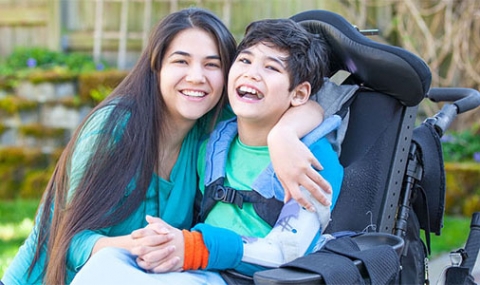Intellectual and Developmental Disabilities
Intellectual and Developmental Disabilities

At INTERFACE Referral Service, we focus on connecting members of our communities with mental health providers. We also value the importance of learning about the mental health conditions that may be affecting your thinking, feeling, behavior, or mood.
Therefore, we have created "Mental Health Topic Pages". The majority of our topic pages will direct you to Network of Care Massachusetts! Network of Care Massachusetts has a library database of over 30,000 fact sheets and articles. Topics on behavioral health issues are written by leading experts and organizations in their fields.
What is a Developmental Disorder?
A developmental disorder is a broader term encompassing several disorders. The Diagnostic and Statistical Manual, Fifth edition, (DSM 5), (2013) includes a new chapter about developmental disorders entitled, “Neurodevelopmental Disorders.” The new category includes intellectual disability (Intellectual Developmental Disorder), communication disorders, autism spectrum disorder, attention deficit hyperactivity disorder, specific learning disorder, and motor disorders.
What is Intellectual Disability?
An estimated 3 million Americans have intellectual and developmental disabilities. Intellectual and developmental disabilities are usually present at birth and limit the growth trajectory of physical, intellectual, and/or emotional aspects of a person’s development. The term developmental disabilities refers to a broad range of dysfunction in physical, intellectual, and emotional health.
According to the DSM V (2013), Intellectual Disability can be diagnosed until approximately age 18, and determines a person’s cognitive, intellectual, and practical abilities to perform daily functions. In 2002, the American Association on Mental Retardation listed criteria for diagnosing intellectual disability by identifying factors to assess and inform treatment for intellectual disability. These factors included limitations in functioning, valid assessment across cultural and linguistic backgrounds, and identifying the type(s) of disabilities in order to find providers who can improve daily functioning.
The criteria for diagnosis has slowly shifted from solely the intelligence quotient (IQ), to a combination of IQ, adaptive functioning, and age the disability originated. Intellectual Disability is diagnosed through clinician assessment and standardized testing. The label of this disorder has changed from mental retardation to intellectual disability to align with the World Health Organization definition. An intellectual disability often co-occurs with a developmental disorder, meaning individuals often carry two diagnoses under the broad “umbrella” of neurodevelopmental disorders. For example, individuals diagnosed with Autism Spectrum Disorder may have Intellectual Developmental Disorder, or many individuals diagnosed with Attention Deficit Disorder often meet the criteria for Specific Learning Disorder, too.
Intellectual Disability and Mental Health Disorders
Intellectual and Developmental Disabilities (IDD), or Intellectual Disabilities (ID), can co-occur with other mental health concerns. The prevalence of a mental health disorder (i.e. depression, anxiety) is contested, but most sources propose that people with ID are 3-5 times more likely to have a co-occurring mental health disorder than those without ID. The Journal for Intellectual Disability Research explains two opposing views regarding intellectual disability and mental health disorders. According to Deb (2001), it was originally thought that the ID population “is protected from certain intellectual and psychological stress by having intellectual disability, and therefore, are less prone to develop psychiatric illness. However, in the past two decades, the more prevailing view is that people with ID are more vulnerable to psychosocial stress than people without ID, and therefore, are more likely to develop psychiatric symptomatology.”
The presentation of mental health disorders in persons with IDD varies, and may be atypical in nature. Often, the IDD population’s clinical symptoms differ from the DSM criteria for diagnosis. Mental health disorders in IDD individuals may go undiagnosed due to the behavioral presentation of symptoms. For example, behaviors associated with mental health disorders may be behaviors that were already present due to intellectual and cognitive delay, but exaggerated in response to the mental health disorder. This can make it difficult for clinicians to discern if the behaviors are related to the intellectual disability, or if there is an additional mental health concern.
How can therapy help individuals with Intellectual Disability?
Both individual and group therapy are effective in addressing the co-occurring psychiatric issues in individuals with IDD. Group psychotherapy in the form of role-playing and positive reinforcement allow people with intellectual disability to practice positive social skills, while interacting in a structured setting addresses the often nuanced skills of turn-taking in conversation or reading social cues. An adapted Dialectical Behavior Therapy (DBT) program, combined with The Skills System, has also proven effective in addressing the co-morbid psychiatric disorders in this population, as discussed by Brown (2013). DBT and The Skills System, can help clients with IDD learn skills to regulate the emotions that lead to challenging behaviors. In addition, mindfulness-based therapy, behavioral activation strategies, and creative arts therapies are often used as modalities in individual psychotherapy. Mindfulness techniques paired with behavioral activation allow IDD clients to decrease anxiety through concrete exercises with daily practice. Creative arts therapy uses nonverbal activities for emotional expression. This is helpful for individuals with co-occurring language disorders. Providers often use music, art, and movement to allow for freedom of expression to process difficult feelings and past events, and to socialize with others.
To learn more, visit these Network of Care Resources:
Independent Living for People With Disabilities
Siblings: Brothers and Sisters of People Who Have Intellectual and Developmental Disabilities
Ten Ways to Promote Mental Health in Infants and Toddlers with Developmental Disabilities
